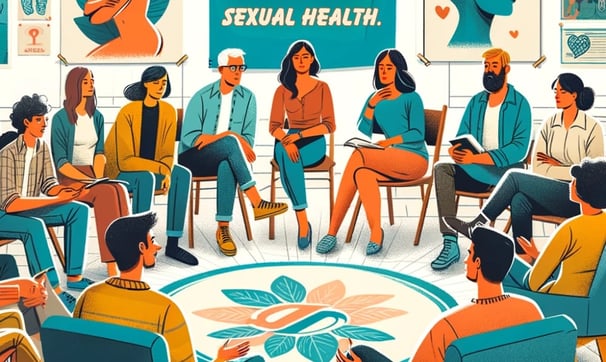Confronting the Shame: Breaking Down the Stigma Surrounding Sexual Health
COMMUNITY


Explore the complex issue of shame and stigma in sexual health, understand its origins, and learn how we can collectively work to create a more open and supportive environment.
Confronting the Shame: Breaking Down the Stigma Surrounding Sexual Health
Sexual health is an integral part of our overall well-being, yet it's often clouded by stigma and shame. This pervasive issue can hinder open discussions, delay seeking medical help, and exacerbate the challenges surrounding sexual health matters. Understanding and addressing this shame is crucial for fostering a healthier, more informed society.
1. The Roots of Sexual Health Stigma
The stigma surrounding sexual health often stems from cultural, religious, and social norms that have historically viewed topics related to sex and sexuality as taboo. Misinformation and lack of education further contribute to misconceptions and judgmental attitudes.
2. Impact of Stigma on Individuals
Shame and stigma can lead to feelings of embarrassment and fear, deterring individuals from seeking necessary medical care or getting tested for STIs. It can also lead to poor self-esteem and mental health issues, as people struggle with internalized negative perceptions.
3. The Role of Education in Combating Stigma
Education plays a pivotal role in breaking down the stigma. Comprehensive sexual health education that starts early and continues into adulthood can help normalize conversations about sexual health and dispel myths and misinformation.
4. Media and Representation
How sexual health is portrayed in media significantly influences societal attitudes. More positive and realistic representations of sexual health issues in the media can help reduce stigma and foster a more open dialogue.
5. The Importance of Supportive Healthcare Environments
Healthcare providers must create non-judgmental, empathetic environments where individuals feel safe discussing sexual health concerns. This includes using inclusive language, offering privacy, and providing judgment-free care.
6. Personal Stories and Advocacy
Sharing personal experiences can be powerful in challenging stigma. Advocates and individuals who openly discuss their sexual health journeys can help others feel less alone and encourage more open conversations.
7. The Power of Community Support
Support groups, whether online or in-person, can provide a space for individuals to share experiences and receive support. Community solidarity plays a crucial role in overcoming the shame associated with sexual health issues.
8. Moving Forward
The journey to de-stigmatize sexual health is ongoing. It requires collective effort from individuals, educators, healthcare providers, media, and policymakers. By continuing to advocate for open discussions, comprehensive education, and supportive care, we can shift towards a society where sexual health is viewed as a normal, integral part of our well-being.
Conclusion
Addressing the shame and stigma surrounding sexual health is vital for both individual and public health. By fostering open, informed, and supportive conversations, we can create an environment where everyone feels empowered to seek knowledge and care for their sexual health without fear of judgment.
